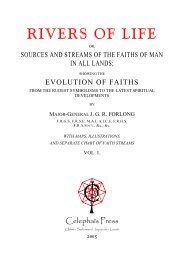Dutch Fairy Tales by William Elliot Griffis.pdf
Dutch Fairy Tales by William Elliot Griffis.pdf
Dutch Fairy Tales by William Elliot Griffis.pdf
You also want an ePaper? Increase the reach of your titles
YUMPU automatically turns print PDFs into web optimized ePapers that Google loves.
Towards evening he shakes out his wings, flaps them once or twice, and takes a walk, but he is never in haste.<br />
Beginning his hunt, he soon has enough frogs, mice, grubs, worms or insects to make a good meal. It is<br />
because this bird feels so much at home, in town and country, making part of the landscape, that we so<br />
associate together Holland and the stork, as we usually do.<br />
The <strong>Dutch</strong> proverb pictures the scene, which is so common. “In the same field, the cow eats grass; the<br />
grayhound hunts the hare; and the stork helps himself to the frogs.” Indeed, if it were not for the stork,<br />
Holland would, like old Egypt, in the time of Moses, be overrun with frogs.<br />
The <strong>Dutch</strong> call the stork <strong>by</strong> the sweet name “Ooijevaar,” or the treasure−bringer. Every spring time, the boys<br />
and girls, fathers and mothers, shout welcome to the white bird from Egypt.<br />
“What do you bring me?” is their question or thought.<br />
<strong>Dutch</strong> <strong>Fairy</strong> <strong>Tales</strong> for Young Folks<br />
If the bird deserts its old home on their roof, the family is in grief, thinking it has lost its luck; but if Daddy<br />
Stork, with Mrs. Stork's approval, chooses a new place for their nest, there is more rejoicing in that house,<br />
than if money had been found. “Where there are nestlings on the roof, there will be babies in the house,” is<br />
what the <strong>Dutch</strong> say; for both are welcome.<br />
To tell why the stork loves Holland, we must go back to the Africa of a million years ago. Then, we shall ask<br />
the <strong>Dutch</strong> fairies how they succeeded in making the new land, in the west, so popular in the stork world. For<br />
what reason did the wise birds emigrate to the cold country a thousand miles away? They were so regular and<br />
punctual, that a great prophet wrote:<br />
“Yea, the stork in the heaven knoweth her appointed times.”<br />
Ages ago, there were camels and caravans in Africa, but there was no Holland, for the land was still under the<br />
waves. In India, also, the stork was an old bird, that waded in the pools and kept the frogs from croaking in<br />
terms of the multiplication table. Sometimes the stork population increased too fast and some went hungry for<br />
food; for, the proverb tells us that a stork “died while waiting for the ocean to dry, hoping to get a supply of<br />
dried fish.”<br />
When on the coast of the North Sea, the Land of a Million Islands was made, the frog emigrants were there<br />
first. They poured in so fast, that it seemed a question as to who should own the country−frogs or men. Some<br />
were very big, as if ambitious to be bulls. They croaked so loud, that they drowned out the fairy music, and<br />
made the night hideous with their noises. The snakes spoiled the country for the little birds, while the toads<br />
seemed to think that the salt ocean had been kept out, and the land made, especially for them.<br />
The <strong>Dutch</strong> fairies were disgusted at the way these reptiles behaved, for they could not enjoy themselves, as in<br />
the old days. If they went to dance in the meadow, on moonlight nights, they always found a big bullfrog<br />
sitting in their ring, mocking them with its bellowing. So when they heard about the storks in Africa, and what<br />
hearty appetites they had, for the various wrigglers, crawlers, jumpers and splashers in the waters, they<br />
resolved to invite them, in a body, to Holland.<br />
The <strong>Dutch</strong> fairies knew nothing of the habits of the bird and scarcely imagined how such a creature might<br />
look, but they heard many pleasant things about the stork's good character. The wise bird had an excellent<br />
reputation, not only for being kind to its young, but also for attending to the wants of its parents, when they<br />
were old. It was even said that in some countries the stork was the symbol for filial piety.<br />
So the fairies of all the Netherlands despatched a delegation to Egypt and a congress of storks was called to<br />
consider this invitation to go west. Messengers were at once sent to all the red−legged birds, among the<br />
WHY THE STORK LOVES HOLLAND 67






![[PDF] Prolegomena](https://img.yumpu.com/16774951/1/190x245/pdf-prolegomena.jpg?quality=85)









